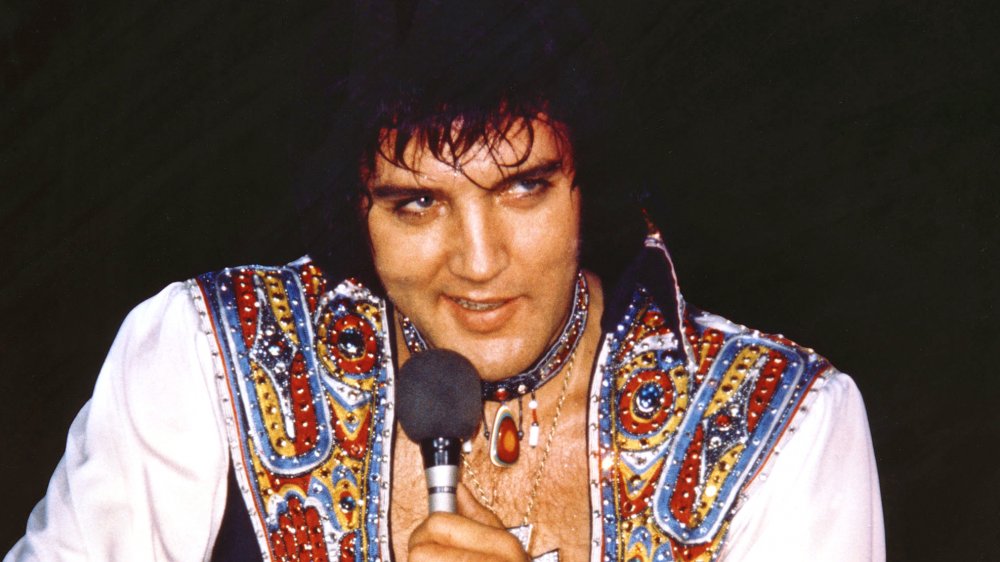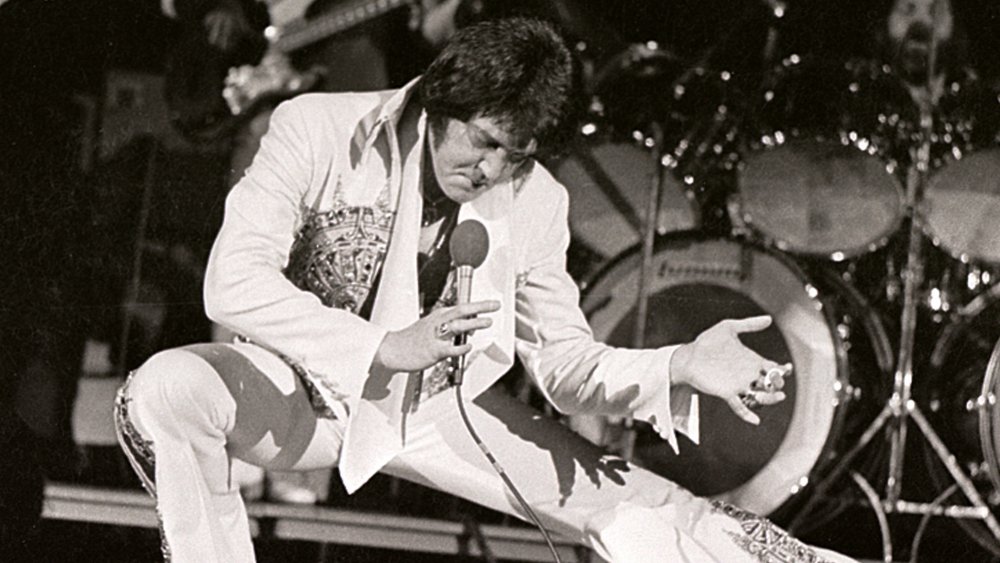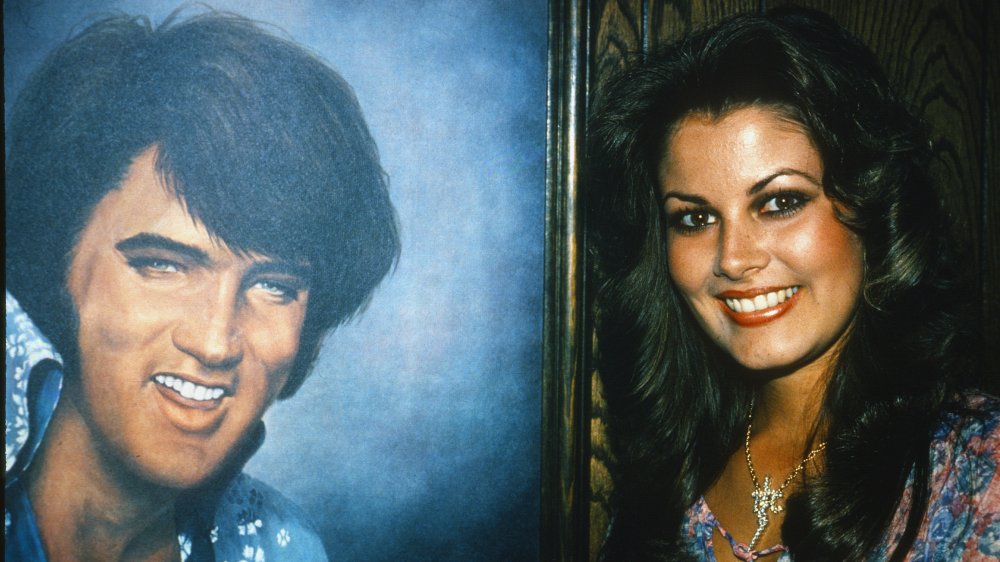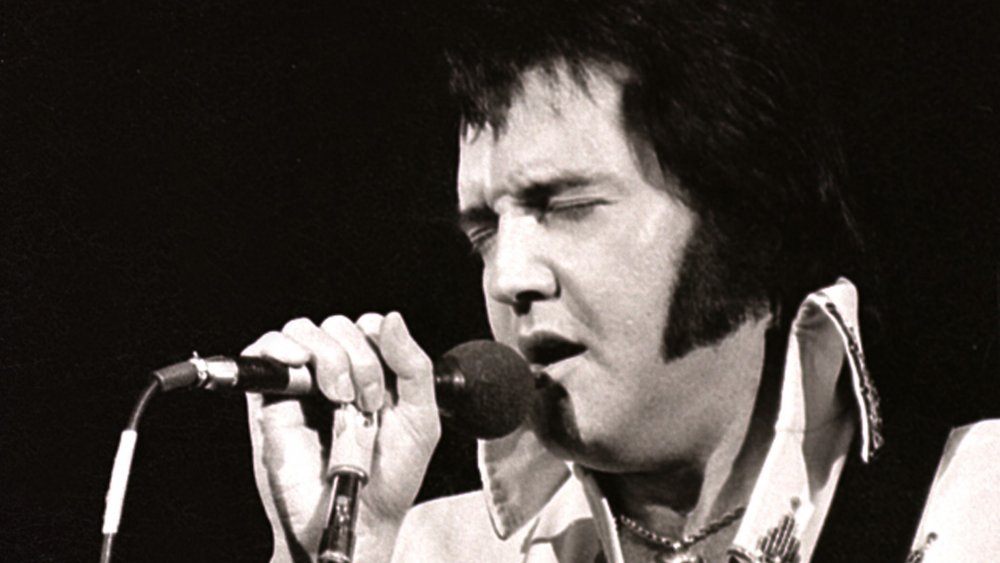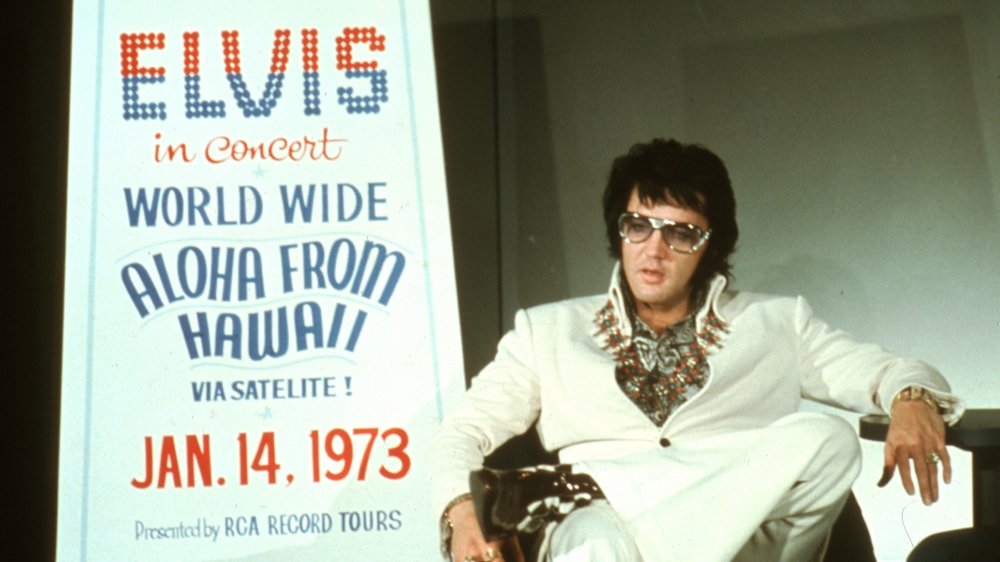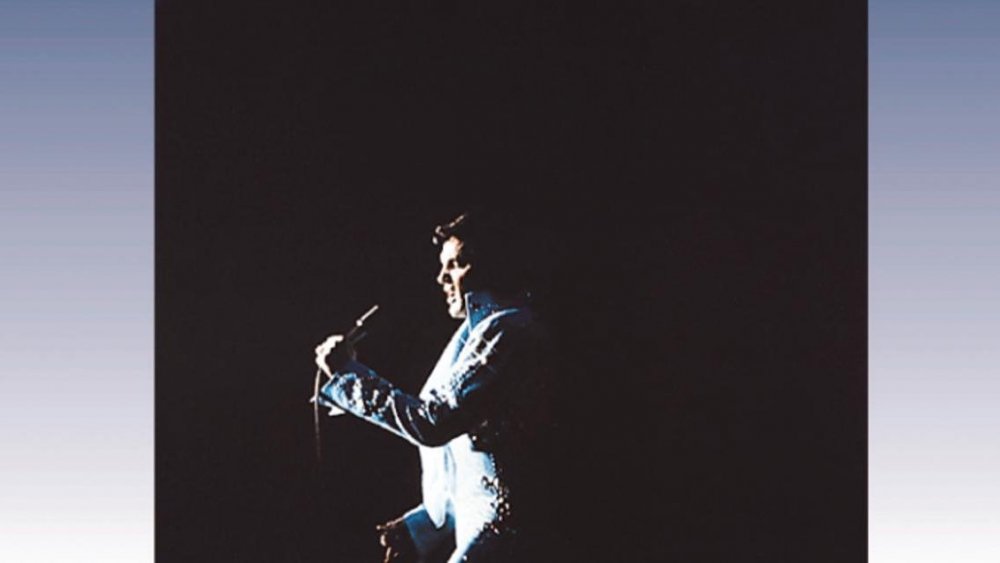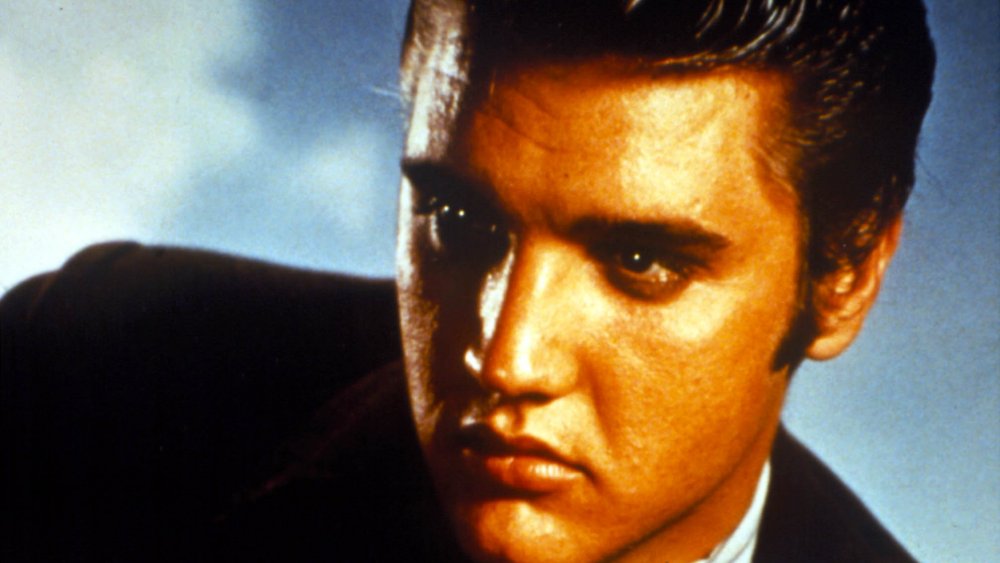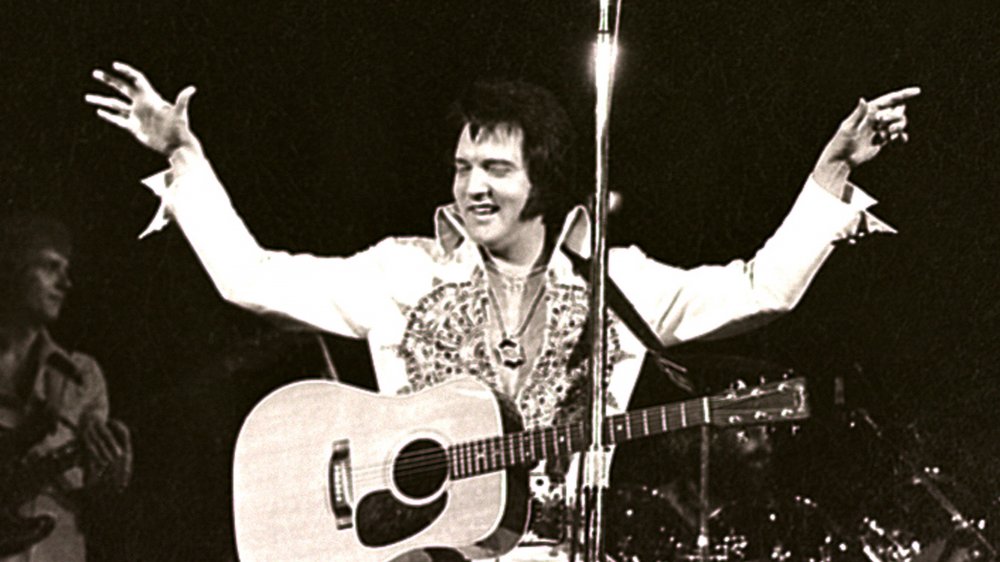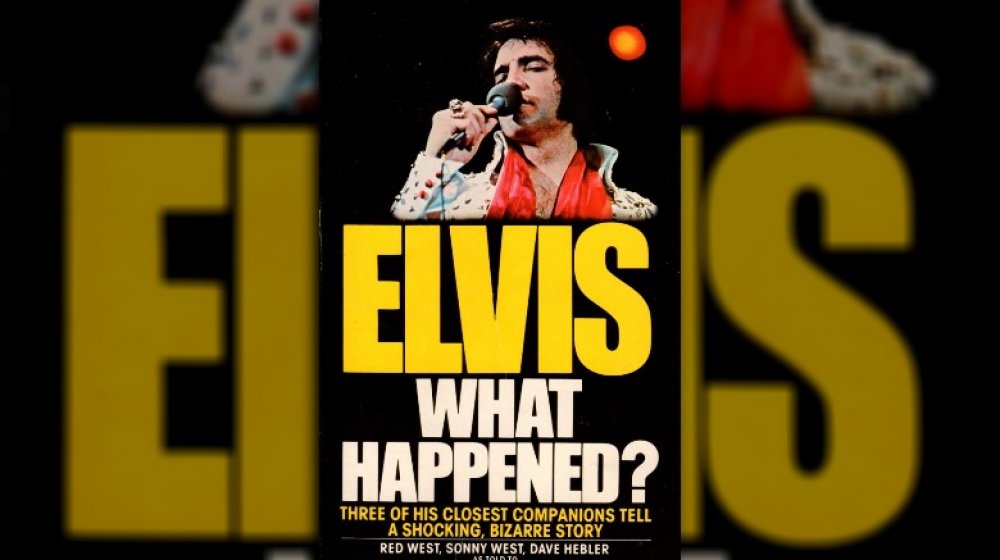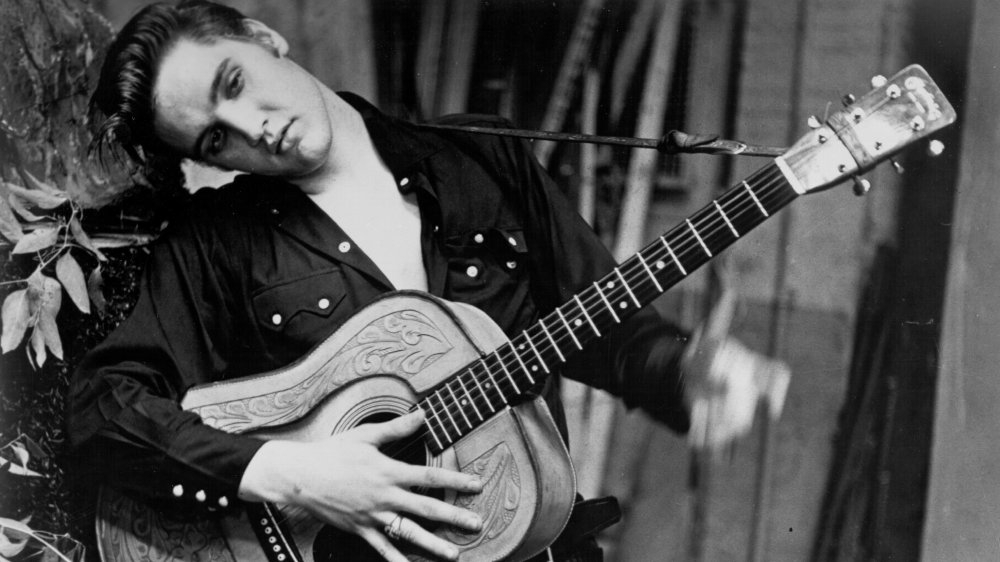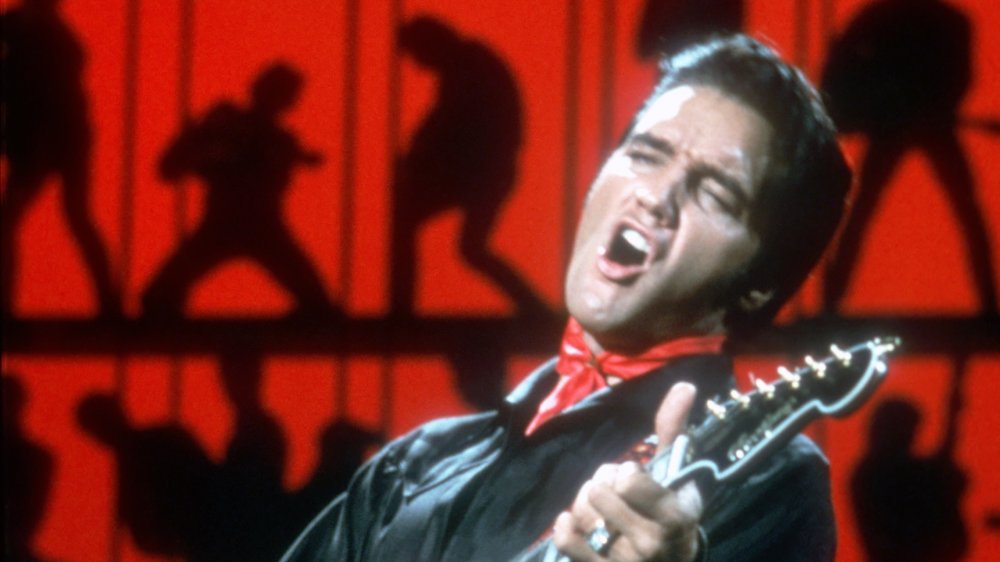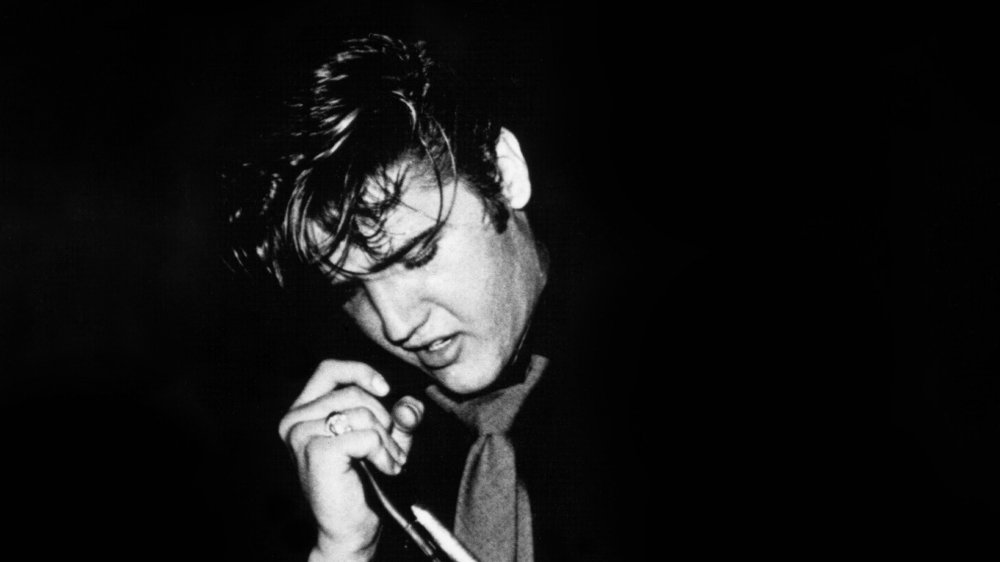What The Final 12 Months Of Elvis' Life Were Like
Few if any figures in rock and roll history are as timeless — or controversial — as Elvis Presley. A doe-eyed boy from the South whose unique mix of barking and crooning made him both a rebel and a heartthrob, Elvis changed the way the world thought about music, pop culture, and celebrity. His hip-swinging antics might seem tame to today's audiences, but when he first emerged as a pop star, Elvis introduced millions to rock's inherent sexuality. Meanwhile, though his adoption of African-American musical traditions is a bone of contention for many listeners today, in his heyday it was a powerful way to put non-white rhythms in front of segregated audiences. "Hound Dog" is an antique in 2020, but when it first premiered, it was a revolution.
And yet, when Elvis died on August 16, 1977, he had become something entirely different from his former self. Dealing with addiction and health issues and having a difficult time adjusting to the shifting cultural climate of the '60s and '70s, Elvis died a Vegas showman rather than a groundbreaking rocker. This kitschy new incarnation of his identity at the time of his death — what many refer to as "Old Elvis" — led to him becoming a new sort of posthumous icon, with many claiming his passing was faked and that Elvis was either alive on a private island somewhere or abducted by aliens.
But when one looks at the last 12 months of Elvis' life, it becomes clear that the truth behind the King Of Rock And Roll's death might have been even stranger than the rumors people spread about him.
Elvis had a private doctor who fed him any pill he wanted
As a young man embracing both a punishing work schedule and the stresses of newfound celebrity, Elvis was under a tremendous amount of pressure. According to LiveAbout.com, Elvis became dependent on several different types of prescription drugs, specifically amphetamines to keep him awake and barbiturates to help him sleep or relax. Early on, these were heavily pushed by his manager, the infamous "Colonel" Tom Parker, who many believe swindled the naive young Elvis while running him ragged.
But by 1976, Elvis wasn't just getting his uppers and downers from his manager. He had a private doctor who would prescribe him any pill he asked for, according to a People Magazine story shortly after his death. Dr. George Nichopoulos, aka "Dr. Nick," traveled with Elvis, and carried three suitcases of pills to make sure he could fulfill any of Elvis' needs. It was claimed that over the last 20 months of Elvis' life, Dr. Nick prescribed him over 12,000 pills. (The doctor said they were for Presley's entourage as well.) His excuse for throwing all these high-octane drugs around? If he didn't prescribe the pills to Elvis, someone else would, and at least this way he wouldn't get them off the street.
The toxicology report from Elvis' death said he had the opiates Dilaudid, Demerol, and Percodan in his blood, not to mention Quaaludes and codeine. However, though Dr. Nick was charged with 11 felony accounts of overprescribing drugs, he was acquitted — the medical examiner claimed that Elvis had died of heart disease, adding, "Had these drugs not been there, he still would've died."
Elvis wouldn't leave Graceland -- not even to record
By 1976, Elvis had become disenfranchised and unhinged, his drug use, bad health, and financial excess chipping away at his composure. He spent most of his time holed up in the elaborate den — nicknamed the "Jungle Room" for its exotic decor — of his Memphis compound Graceland. Most worrisome to his record label, RCA, was that the King had become entirely uninterested in going into the studio and recording.
According to Rolling Stone, that was when producer Felton Jarvis had a game-changing idea: If Elvis wouldn't go to the studio, they'd bring the studio to Elvis. Presley had recorded tracks at home in Palm Springs in 1973 to great success, and said that he enjoyed being in a room with his fellow musicians to feed off their emotions — so why not set up a mobile studio in Graceland? Elvis approved of the idea, and the label sent a studio truck to his home.
In many ways, the Jungle Room was perfect for the task. It was huge, and its shag carpeting naturally absorbed ambient sound, although the fake waterfall did have to be turned off. It was there, in October 1976, that Elvis recorded his final studio sessions, resulting in some of his most memorable and emotionally crushing material to date.
Elvis had a new girlfriend, who many thought was riding the wave of his downfall
In November 1976, Elvis split with his girlfriend of four years Linda Thompson, according to The Wrap. Linda had been a stabilizing force in the singer's world, but she eventually left him because she wanted a more normal life.
Replacing Linda was actress Ginger Alden (above), a woman 20 years Elvis' junior. In December 1976, after a brief courtship, the singer gave her an engagement ring made from the diamond in his own TCB ring — an action that many thought was more for show than actual sentiment. In turn, many in Elvis' entourage believed Ginger to be nothing more than a gold-digger. Lamar Fike, a member of Elvis' "Memphis Mafia" entourage, famously said Ginger "didn't give a rat's ass about him."
In Ginger's mind, these opinions were unfair stones cast by her fiance's cronies. "Not getting to know them well, shortly after Elvis passed away, I was extremely disappointed to see the character of some that Elvis had around him," she said in a 2019 interview with Elvis' Australian fan club while promoting her book Elvis and Ginger: Elvis Presley's Fiance and Last Love Finally Tells Her Story. "A few speculated and began telling untruths regarding Elvis and me which were completely unwarranted, mean spirited and wrong."
Elvis's food addiction made him 'a grotesque caricature of his former self'
When critics and fans describe Elvis in his later years, one term used is "Fat Elvis." While this is a cruel and derogatory way to describe someone dealing with personal health problems, it's undeniable that Elvis' eating and weight issues colored his last year on Earth.
According to the New York Daily News, by the end of his life Elvis was consuming enough calories to feed several people every day. Growing up in the South, Elvis took comfort in greasy homestyle foods. As an adult, one of his favorite meals was a roll stuffed with bacon, peanut butter, and jelly, alongside midnight snacks like hamburgers and deep-fried bread. While he was also taking many dangerous pharmaceuticals throughout his life, it was the heart disease caused by his bad diet that ultimately killed him.
The critics noted his weight gain when reviewing his public appearances. In Rees Quinn's biography Elvis, writer Tony Scherman is quoted as saying that by early '77 "Presley had become a grotesque caricature of his sleek, energetic former self. Hugely overweight, his mind dulled by the pharmacopeia he daily ingested, he was barely able to pull himself through his abbreviated concerts."
Elvis sometimes couldn't get out of bed to perform
Most challenging during Elvis' final years was his nonstop schedule of his live performances. During many shows, the audience wouldn't be able to understand what he was saying, and he would often leave the stage early, unable to continue.
This manifested most egregiously in March 1977 during two stops in Louisiana. According to a 1977 review in Alexandria Town Talk, the first show in Alexandria lasted less than an hour before Elvis had to leave the stage. But according to the book The Mysteries Surrounding the Death of Elvis Presley, even worse was in Baton Rouge, where Elvis had to cancel a show because he couldn't make it out of his hotel bed in order to get to the venue. The rest of the tour was subsequently canceled, acting for many historians as a benchmark of just how far the King had fallen from the pedestals of his youth.
Elvis released his tragic, pained final album months before his death
By 1977, Elvis had lost all interest in recording new music. However, the home recording sessions of 1976 were fruitful, and seemed to inspire a burst of creativity in the King. After the final recording session in October of '76, RCA set to work cobbling the tracks together into what would be Elvis' final records — a fact none of them knew, but which the pained music seems to foreshadow in hindsight.
Moody Blue, released in February 1977, was a mix of live recordings and new studio tracks, containing two of Presley's most widely regarded songs. Title track "Moody Blue" became Elvis' final Number One single; the song is in keeping with the pop music of the time, tinged with disco and exotica, but still showcases the warbling, lonely figure that the singer had become. But it's "She Thinks I Still Care" that is regarded by many to be Elvis' finest latter-day moments, illustrating a man trying to move on while trapped in the role tailor-made for him and revealing, according to Rolling Stone, "a real-life glimpse into the life of an increasingly isolated man."
Sure, Elvis will always be remembered for "Jailhouse Rock" and "Can't Help Falling In Love With You", but these final tracks are a testament that even lonely, depressive Elvis had a message that would resonate with audiences for years to come.
Elvis was depressed towards the end -- and maybe even suicidal
Elvis' passing is often used as the archetypal rock star death — a tragic accident caused by a poor health and drug use. But was the King simply ignoring his well-being, or was he having suicidal thoughts?
In the recent HBO documentary Elvis Presley: The Searcher, the singer's longtime wife Priscilla revealed that she wasn't sure whether Elvis' death was really an accident. Priscilla pointed out that Elvis had written a note to friend and "Memphis Mafia" member Joe Esposito, which stated, "I'm sick and tired of my life."
Additionally, a report from the tabloid The Sun shows that Priscilla considered depictions of Elvis as a bystander in his own life to be inaccurate, only that he was dismissive of attempts to help him get treatment. "He knew what he was doing," she said, "and people go, 'Why didn't anyone do anything?" Well, that's not true. People there in the inner group did — but you did not tell Elvis what to do. You'd have been out of there faster than a scratched cat. They would try and — no way."
If you or anyone you know is having suicidal thoughts, please call the National Suicide Prevention Lifeline at 1-800-273-TALK (8255).
Elvis's final show suggested he knew the end was near
Elvis' last live gig was on June 26, 1977, at the Market Square Arena in Indianapolis to a crowd of 18,000 fans, according to LiveAbout. The setlist included many of his classic hits like "Hound Dog," "Don't Be Cruel," and "Jailhouse Rock," as well as newer numbers like "Hurt" and his cover of "Bridge Over Troubled Water." As he had in recent gigs, Elvis appeared overweight and at times winded but was reported to have given a solid performance overall.
What confused some people, though, was that Elvis took a portion of the show to introduce everyone from his life onstage. The moment came toward the end of the night, just before his closing performance of "Can't Help Falling In Love With You." Many would later wonder if this was because Elvis knew somewhere deep down that he would never play again and wanted to shout out all of those who made his career possible.
Equally cryptic for some were the parting words the King said as he left the stage: "We'll meet again. God bless ... adios."
Elvis fired his 'Memphis Mafia' bodyguards, so they published a tragic tell-all book
Throughout Elvis' career, he was surrounded by a crew of friends, hangers-on, and enablers that were casually dubbed the "Memphis Mafia." The gang held various roles, from sounding boards for Presley's personal problems to helping him wade through crowds of rabid fans.
Three of the Mafia members, David Hebler, Robert "Red" West, and Robert's cousin Sonny West, had acted as Elvis' bodyguards for much of his career. (Red had known the singer since the '50s.) But in 1976, all three were fired to "cut back on expenses." While some claimed this was because they'd been rough enough with fans to incite lawsuits, others countered that it was due to their criticism of Elvis' drug use.
As recorded in Rolling Stone, the three bodyguards co-wrote a tell-all biography of Elvis that was released only days before his death. Titled Elvis: What Happened?, the book offered the public its first look into Presley's drug use and sex life. While many of Elvis' loyal fans refused the buy the biography upon its initial release — in May 1977 in the UK and late July in the US — the King's death soon thereafter, and the revelation that many of the book's stories were painfully accurate, turned it into one of the most successful Elvis books of all time.
His only real friend was his live-in nurse
Like many stars who became hugely famous before the concept of celebrity handlers had been formalized, Elvis was surrounded by yes-men and sycophants. This was especially true during the last year of his life, when he was deep in his chemical dependency and had left behind many of the loyal friends of his youth.
The King's only true friend near the time of his death was arguably Letitia Henley, his live-in nurse. While the world at large saw Elvis as the man who had it all, Letitia — known to those around Elvis as "Tish" — had a private window into his personal struggles. "He was not only my patient, but a good friend," Henley later wrote in a book, via Express. "He was miserable. He was depressed about aging and not having a woman he loved. He missed Priscilla. His friends kept pimping him with pretty 17- and 18-year-old girls but he had nothing in common with them."
Even Tish lives with pain surrounding Elvis' death, which she said came as "a complete shock" to her. When Elvis asked for sleeping pills during his final hours, it was she who told his private doctor where to find them, and she regrets not being there as he died. "You always think there was something you could have done, that he might still be alive today. That haunts me."
Elvis' last 24 hours were a bizarre whirlwind of activity
Given his pill dependency and excessive weight, some might assume that Elvis spent the day before his death lying in bed eating or doing drugs. But even more shocking and strange might be the sheer amount of activity undertaken by the King in the hours before he passed away.
As detailed in the documentary Elvis Presley: The Last 24 Hours, Elvis' final day on earth included a nighttime trip to the dentist in search of prescription drugs, a 4 a.m. game of racquetball with his cousin Billy Smith, and an impromptu piano performance of classics including "Blue Eyes Crying In The Rain." He was last seen alive going into the bathroom to read. He was found there by Ginger Alden around 2 p.m. on August 16.
"The phone rings — intercom," said Joe Esposito, foreman of the Memphis Mafia. "One of the maids picked up the phone, and it's Ginger. She says, 'Come upstairs, I need help. Elvis just fainted.' I ran upstairs, I go into the bathroom, and Elvis had fell over and was laying on the floor. I turned him over ... and I knew. I knew he was dead."
Elvis' death left a legacy as important as his life
Elvis Aaron Presley died August 16, 1977, at the age of 42. For fans of rock and roll everywhere, the King's death was a monumental blow. But with his life ended, those who loved him could now remember the man he'd once been, revolutionizing rock music with his energy, charisma, and raw talent.
And yet, the darkness and desperation surrounding Elvis' final months and death have made him an imperfect icon idolized by subcultures your average Graceland-bound tourist might not expect — punks, goths, and modern-day rockabillies, who appreciate the mismatched sides of the singer's life. In 2020, Glenn Danzig, heavy metal vocalist and frontman of horror-punk act The Misfits, released Danzig Sings Elvis, an album of Elvis covers. In fact, Danzig's vocal style is so reminiscent of Presley's that he's earned himself the nickname "Evil Elvis," a title he's happy to accept.
"Anytime someone mentions my name and Elvis' name in the same sentence, that's great," he told Rolling Stone. "It doesn't get better than that."
